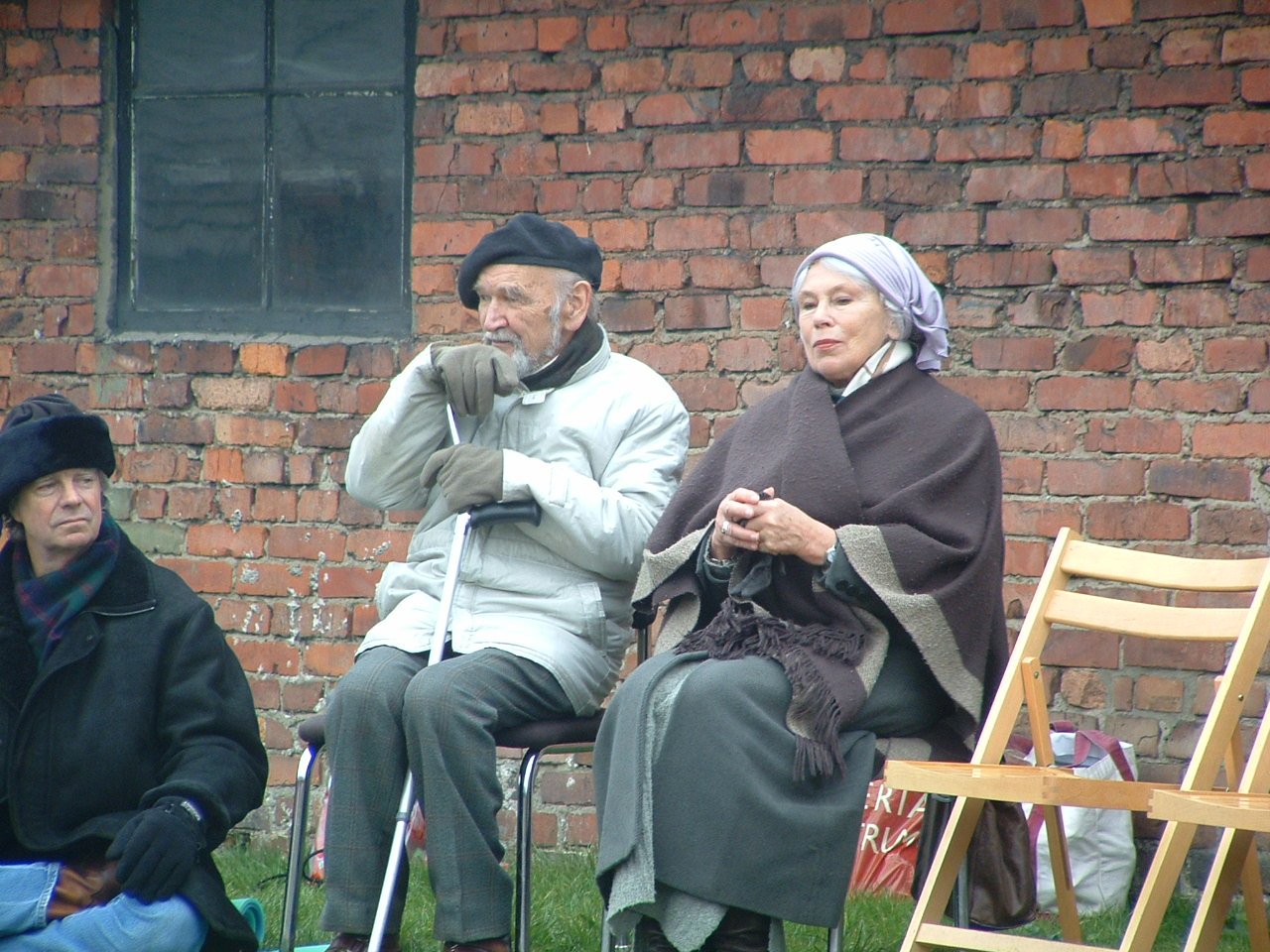Leadership of love - is it possible?
"Hitler and Mussolini were great leaders who motivated millions, but their methods were based on fear. What we need today are leaders who can inspire millions to take action out of love."
These words were said to me by one of the most remarkable individuals I have ever had the privilege to meet, Marian Kolodzi, a survivor of the death camps.
Last week, without any prior planning, I found myself again on a pilgrimage to the Auschwitz-Birkenau extermination camps, around the same time of the holocaust memorial Day 2023. When things like this happen without planning, I feel as though I'm being guided by greater forces to the precise intersection of time and place that I'm meant to be in, for mysterious reasons.
I am intimately familiar with Auschwitz. For 14 years, I was part of the leadership team for a meditative bearing-witness retreat on behalf of the international Zen-Peacemakers organization, held there every November. Every year, during the retreat, we would sit in meditation for an entire week in various locations throughout the camp. I spent many days and nights in this most terrible place, contemplating, praying and reflecting deeply into my heart.
Just like any other Israeli, I had the unconscious assumption that 'the Holocaust is ours' when I first visited Auschwitz. However, one of the strangest things that happened to me there was realizing that it wasn't quite true. The Holocaust belongs to everyone. It's not a matter between Jews and other nations, but a collective human matter. The Holocaust shows what one nation can do to other nations under certain circumstances, and what a person (yes, a person - and not ‘a monster’') might do to another under similar circumstances."
Today, I want to share with you the story of a love hero I met at Auschwitz, a Polish Holocaust survivor named Marian Kolodzi. Until his passing in 2009, Marian joined us every year for the retreat, holding hands with his beloved wife Helina and leaning on his walking stick. At only 19 years old, Marian was sent on the first transport to Auschwitz with his friends from the Polish resistence, where he survived in various camps for five years until the fall of Nazi Germany. For five years he lived in hell on earth and still, Marian was full of light and love when we met him as an old man, and he claimed that now he is living in heaven and pointed to his beloved wife Helina.
In the retreat we also had quite a few German participants, but Marian, who suffered terribly at the hands of the Nazis, did not keep distance or hold any grudges towards them. Instead, he very clearly chose love as his philosophy and way of life.
Marian's story of survival is connected to an act of “Epic Love” towards another person, risking his own life in the process. Paradoxically, this act ended up saving him. However, the story actually begins earlier, and this is how I heard it from Marian himself:
The atmosphere in the camp was horrific. Physical and psychological torture, murder and abuse by the guards, hunger, cold, disease and public executions - all of these caused us to lose our sense of humanity. Our sole focus was on survival, and the instinct to survive was what kept us going from one moment to the next. Everyone cared only for themselves, However, everything changed when something unexpected happened.
One day some prisoners attempted to escape. They were caught, and of course executed. In order To create internal pressure amongst the prisoners and discourage escape attempts, the guards would execute ten additional people who were not involved in the attempt.
During the morning roll call, the officer pointed to ten individuals and ordered them to step forward. They were about to be executed by firing squad, but then one of the men began to cry out in tears, pleading for his life; " I have a wife and children out of the camp… please don't kill me, I want to see them again…". At this very moment, a different prisoner stepped forward and said; "I am a monk, I have no wife or children, take me instead of him"
Old and Yong Marian meeting beyond the folds of time
Normally in such cases, the Nazi officer would have ordered the execution of both men, but this time, miraculously, he agreed to the exchange. The man who had been crying was returned to the ranks and eventually survived the war, reuniting with his family, while the monk was taken and executed in his place. This monk was Father Maximilian Kolbe, a Polish Franciscan priest who was sent to Auschwitz as part of the nazi effort to suppress the Polish leadership. However, Father Kolbe was not executed by a firing squad like the others. Instead, the Nazi officer in charge decided that Father Kolbe would die of hunger and thirst. He was confined to an isolation cell in the torture basement of block number 11. Father Kolbe refused to die despite being weakened, starved, and dehydrated. He spent his final days in prayer and seclusion and eventually the guards grew impatient. After two weeks of starvation, they injected him with poison, causing his death.
Marian shared with us how Father Kolbe's heroic sacrifice created a revolution within the camp. Suddenly we remembered that we are human. That there is such a thing as humanity.
Prior to Father Kolbe's act, everyone was focused only on their own survival, but after his heroic act, we began to care for each other. We remembered what it truly means to be human.
Marian was a painter and occasionally he was invited by the Nazis to paint their portraits at parties held near the camp. On one of these occasions, Marian returned to the camp with a slice of bread he had received in exchange. He suddenly noticed another prisoner on the ground, starving and begging for bread with pleading eyes. After being inspired by Father Kolbe's selfless act, Marian decided to share his slice of bread with the desperate prisoner, and they talked for a while.
The prisoner Marian helped happened to work in the paperwork arrangement of the Nazi "court," which sentenced dozens of Polish prisoners to death daily. When he saw Marian's papers arrive at the court, the prisoner decided to repay the favor by moving his case to the pile of outgoing mail that was sent to another concentration camp, ultimately saving him from a death sentence.
For five years, Marian was shuffled between different camps (!) following his traveling paperwork and was eventually released at the end of the war. He then returned to work as an artist, suppressing the memories of the Holocaust. It was only after suffering a stroke at the age of 60 that the memories began to flood him and he started to obsessively draw hundreds of pictures depicting his hellish experience in the Nazi concentration camps.
Marian constructed the exhibition of his paintings as a labyrinth in the basement of Father Kolbe's Franciscan monastery, and it is highly recommended that you visit. You can find more information about it on this website www.kliszepamieci.org.
Me,
with portraits of Father M. Kolbe
In many of Marian's paintings, you can see the shamanic motif of the old Marian meeting the young Marian from the camps. Sometimes, the old man, who survived, embraces the frightened young man, transcending time and space, while other times the young man carries the old man on his shoulders.
In the exhibition, Father Kolbe is depicted numerous times as a hero who brought love into the midst of hell. In some paintings, Father Kolbe is seen taking Jesus down from the cross. For Marian, so it seems to me, Father Kolbe gave meaning to religion itself. Whenever I make a pilgrimage to Auschwitz, one of the places I visit is Father Kolbe's isolation cell in the torture basement of Block 11. The Catholic Church declared him a saint, and even the pope made a pilgrimage to his isolation cell.
The thing that is most important for me to say about Marian is that he was a man of love. He believed in love with all of his heart - even, and especially after the Holocaust. Meeting people who had been through the worst kind of hell and yet emerged with a belief in the healing powers of love, rather than with suspicion, cynicism, or a desire for revenge, was one of the defining experiences of my life.
"Hitler and Mussolini were great leaders who motivated millions, but their methods were based on fear," Marian once told me outside one of the barracks in Auschwitz as he placed his bony hand on my head. "What we need today are leaders who can inspire millions to take action out of love."
Marian and Helena at Auschwitz bearing witness retreat
- Written by Pele Ohad Ezrahi - April 2023





